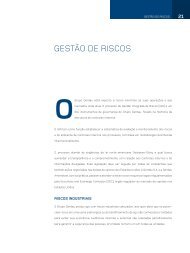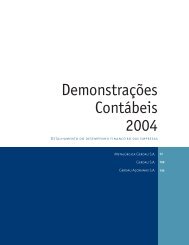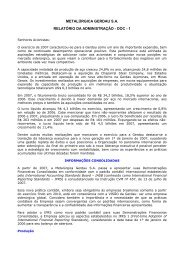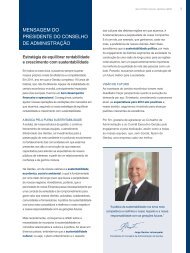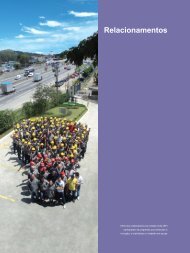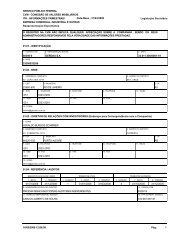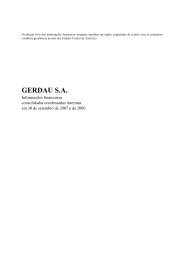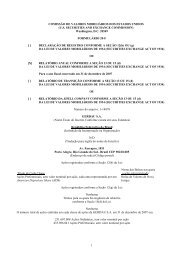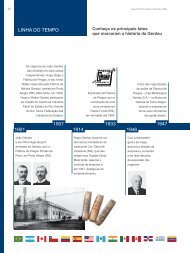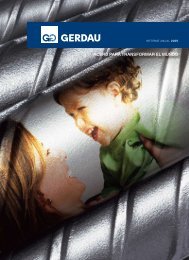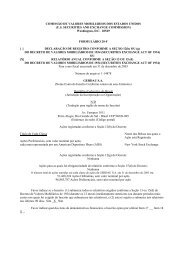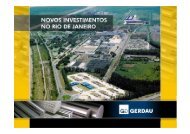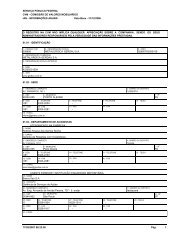Form 20-F - Gerdau
Form 20-F - Gerdau
Form 20-F - Gerdau
You also want an ePaper? Increase the reach of your titles
YUMPU automatically turns print PDFs into web optimized ePapers that Google loves.
management skills rather than capital. <strong>Gerdau</strong> Açominas is currently the third largest crude steel producer in Brazil,<br />
accordingly to the IBS (Brazilian Steel Institute).<br />
Outside Brazil, and notably in North America, <strong>Gerdau</strong> Ameristeel has increased its market share by<br />
acquiring mills which, like their Brazilian counterparts, required administrative adjustments rather than capital.<br />
<strong>Gerdau</strong> has progressively increased its share of the North American market and is currently the second largest North<br />
American long steel producer with nominal capacities of 5.9 million tons of crude steel per year and 5.5 million tons<br />
of rolled products per year, according to Company statistics. <strong>Gerdau</strong>’s industrial units are distributed across North<br />
America to supply local markets along the East Coast of the United States. and the East and Center of Canada.<br />
Following the merger with Co-Steel, completed in October <strong>20</strong>02, <strong>Gerdau</strong> Ameristeel has 10 long steel units.<br />
<strong>Gerdau</strong> also owns three mills in Argentina, Uruguay and Chile. Of these, the Argentine mill is a joint<br />
venture that does not produce crude steel, in which <strong>Gerdau</strong> holds a minority stake. The other two mills in Chile and<br />
Uruguay have a combined output of 510,000 tons of crude steel per year. Although these units make only a minor<br />
contribution to consolidated results, they are highly profitable and efficient.<br />
Main Categories of Products<br />
<strong>Gerdau</strong> provides its customers with a wide range of products within the following major lines:<br />
Slabs, blooms and billets<br />
Products such as billets, blooms and slabs have relatively low added value. Billets are <strong>Gerdau</strong> Açominas’<br />
main products, with blooms and slabs produced in smaller quantities.<br />
Billets: Billets are square section, long steel bars which serve as inputs for the production of wire rod, rebars,<br />
merchant bars, shapes, etc.<br />
Blooms: Blooms, which are also square in shape, are wider but shorter than billets, and are used to<br />
manufacture products such as springs, forged parts, shapes and seamless tubes.<br />
Slabs: Slabs are short, narrow bars, similar to billets in length that are used to produce hot and cold coils,<br />
heavy slabs, profiling and oxy-cutting, etc.<br />
These products may be cast using different processes, such as continuous casting, mechanical<br />
cutting or oxy-cutting, or may be cooled in molds using a conventional casting system that employs cooling<br />
beds. Although this conventional system is not widely used in Brazil, it is still employed at <strong>Gerdau</strong><br />
Açominas’ Ouro Branco mill. This may represent a competitive advantage, since <strong>Gerdau</strong> Açominas is the<br />
only company manufacturing these products and thus has captive customers.<br />
Common long rolled products<br />
Rolled products represent a major portion of <strong>Gerdau</strong>’s production. In <strong>20</strong>03, common steel rolled products<br />
accounted for 66.4% of the Group’s consolidated sales (41.5% by non-Brazilian companies and the remaining 24.9%<br />
by <strong>Gerdau</strong> Açominas, with 16.0% going to the domestic market and 8.9% to exports). The main rolled products<br />
include rebars, merchant bars and profiles.<br />
Drawn products<br />
Drawn items represent higher added value products with higher margins. Drawn products include barbed and<br />
barbless fence wires, galvanized wires, fences, concrete reinforcing wire mesh, nails and clamps. Drawn products<br />
account for 5.8% of the Company's consolidated sales. These products are not exported and are usually sold to the<br />
industrial, civil construction and agricultural sectors.<br />
Specialty steel<br />
Specialty or high-alloy steel requires advanced manufacturing processes and normally includes some degree<br />
of customization. <strong>Gerdau</strong> produces specialty and stainless steel used in tools and machinery (e.g. cold, hot and highspeed<br />
steels), chains, fasteners, railroad spikes and special coil steel at its <strong>Gerdau</strong> Aços Finos Piratini plant.<br />
14



